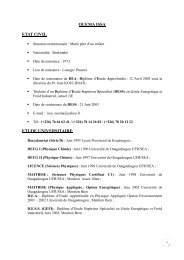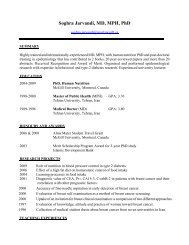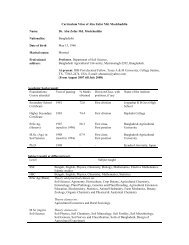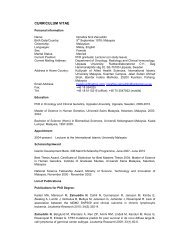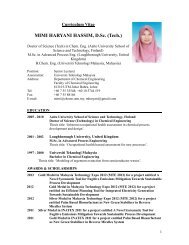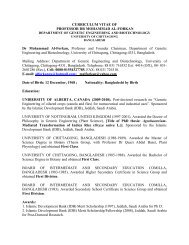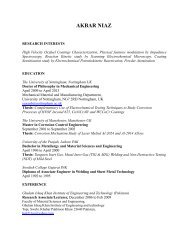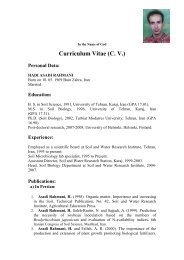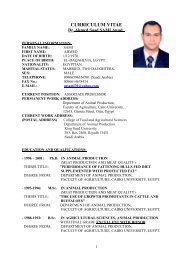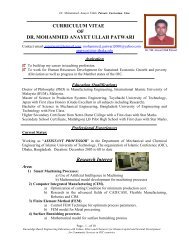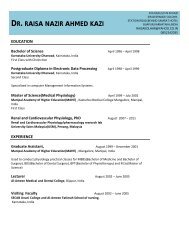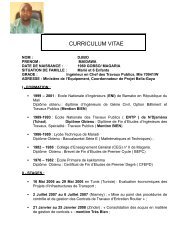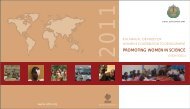Engineering: issues, challenges and opportunities for development ...
Engineering: issues, challenges and opportunities for development ...
Engineering: issues, challenges and opportunities for development ...
You also want an ePaper? Increase the reach of your titles
YUMPU automatically turns print PDFs into web optimized ePapers that Google loves.
ENGINEERING CAPACITY: EDUCATION, TRAINING AND MOBILITYsubjects along with the delivery of specific courses related tothe environment, <strong>and</strong> if the other disciplines need the optionof an environmental major in their discipline area, then there isperhaps considerable opportunity <strong>for</strong> growth within the Environmental<strong>Engineering</strong> discipline.The United Nations International Decade of Education <strong>for</strong>Sustainable Development (2005–2014) 65 provides a timelyreminder that society is expecting change across the professions.As part of this, Environmental <strong>Engineering</strong> faces a particularlychallenging transition, as it both evolves <strong>and</strong> assistsother disciplines. However, rather than being in a threateningpredicament where the progress of other disciplines in thisarea may make environmental engineering redundant, thereis a opportunity <strong>for</strong> the discipline to play a pivotal role, <strong>and</strong>in doing so redefine its niche. Perhaps the Environmental<strong>Engineering</strong> department or school of today will not exist inits current <strong>for</strong>m in 10–15 years time. Rather it may evolve toprovide significant capacity-building services to other disciplinesin addition to offering programmes that provide a moreintegrated underst<strong>and</strong>ing of natural <strong>and</strong> manmade systemsthat work in harmony to increase natural, social <strong>and</strong> economiccapital.7.3.5Research in engineeringeducationErik de Graaff <strong>and</strong> Anette KolmosIntroduction<strong>Engineering</strong> is a practice-oriented profession. For a long time,the training of future engineers took was delivered in theworkplace. After the establishment of engineering schools inthe nineteenth century, the link to engineering practice alwaysstayed important. Engineers were trained <strong>for</strong> professionalpractice, not <strong>for</strong> careers as scientists. This approach lasted thebest part of the twentieth century.After the Second World War, the proportion of the populationthat participated in higher education increased substantially.Following the increase in the number of students, politicians<strong>and</strong> administrators called <strong>for</strong> greater efficiency. Institutesbecame bigger <strong>and</strong> bigger. As a consequence, teaching<strong>and</strong> learning in higher education has turned into a topic <strong>for</strong>research <strong>and</strong> innovation in its own right. Pedagogical centreswere founded at universities in countries in Northwest Europeto train teaching staff <strong>and</strong> to support the improvement ofeducation with research <strong>and</strong> <strong>development</strong>.65 UN General Assembly. 2002. Proclamation of the Decade of Education of SustainableDevelopment (2005–2014), 57th Session, UN General Assembly. Go to: www.desd.org/<strong>Engineering</strong> education has a particular place in higher education.In the Netherl<strong>and</strong>s <strong>for</strong> instance, the academic level of theInstitute of Technology in Delft was recognized in 1905 yet itwasn’t until 1986 that it was officially designated a university.Within higher engineering education, two different types ofschools can be recognized: the more theory-oriented programmesat universities <strong>and</strong> the more practice-oriented programmesat universities of applied sciences. This distinctionis carried on in the <strong>for</strong>m of theoretical <strong>and</strong> applied bachelorprogrammes in the bachelor-master structure adopted in theBologna Process.The emergence of research <strong>and</strong> <strong>development</strong> centres <strong>for</strong>higher education in EuropeThe increasing number of students participating in highereducation resulted in a general call <strong>for</strong> higher efficiency of thecurricula. Educational research – aiming to figure out what elementscontributed to efficiency <strong>and</strong> how it could be improved– was started at different institutions. To find out how toachieve this <strong>and</strong> to provide the necessary support, universitiesin the Netherl<strong>and</strong>s, Germany <strong>and</strong> Sc<strong>and</strong>inavian countries setup their own research <strong>and</strong> <strong>development</strong> centres (Kolmos etal., 2001). 66 The historical <strong>development</strong>s in the Netherl<strong>and</strong>s aredepicted in the section below as an example <strong>for</strong> the <strong>development</strong>sin other European countries.During the 1960s, universities in the Netherl<strong>and</strong>s needed toadjust their teaching methods in order to deal with mass highereducation (Wiegersma, 1989). 67 Innovation <strong>and</strong> improvementsoon became keywords in dealing with this issue. In ascientific environment it seems natural that research plays amajor part in order to establish a solid foundation <strong>for</strong> qualityimprovement. As it was put by a reporter at the end of the firstnational convention on ‘Research of Higher Education’ in theNetherl<strong>and</strong>s in 1966, ‘…what is needed is to establish contactbetween the people who are concerned with the teaching ofscience <strong>and</strong> those who are engaged with the science of teaching’(Vroeiijenstijn, 1981). 68At first, this type of research was mostly conducted by externalexperts or by isolated individual researchers. The scientificbackground of these researchers has been interdisciplinaryright from the start as they came from social science, humanities,science <strong>and</strong> engineering. Most Dutch universities establishedan Institute <strong>for</strong> Research of Higher Education (RWO66 Kolmos, A., Rump, Ingemarsson, I., Laloux, A., <strong>and</strong> Vinther, O. 2001. Organization ofStaff Development – Strategies <strong>and</strong> Experiences. European Journal of <strong>Engineering</strong> Education,Vol. 26, No. 4. pp. 329–342.67 Wiegersma, S. 1989. Innovatie van het hoger onderwijs [Innovation in Higher education].Hoger onderwijsreeks. Groningen: Wolters-Noordhoff.68 Vroeijensteijn, A. (red.) 1981. Kwaliteitsverbetering Hoger Onderwijs [Improvement ofquality in Higher Education]. Proceedings of the fourth national convention Researchin Higher Education, December 1-180-1981. Eindhoven: Stichting Nationaal Congres/1981.347



